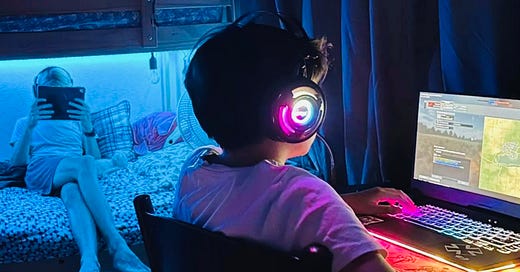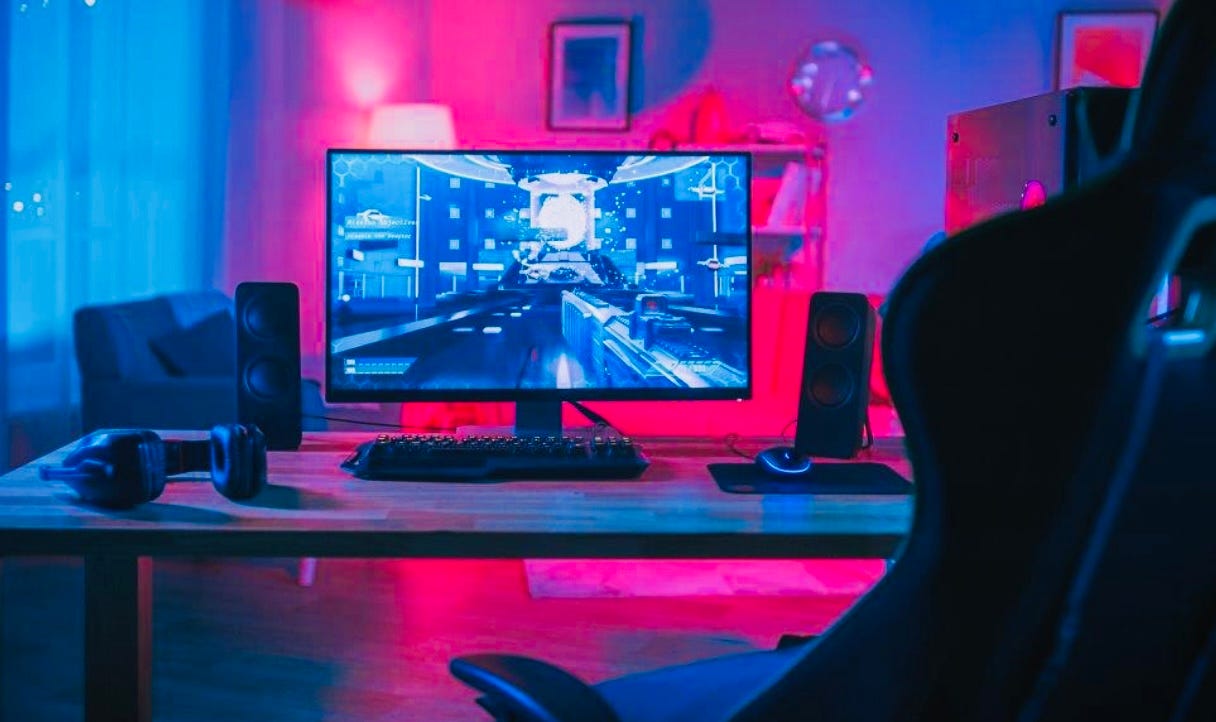Skin Gambling and Gaming: How Developers and Parents Can Protect Players from Addiction
How Video Games Fuel Skin Gambling Addiction and What Developers and Caregivers Can Do to Stop It
Skin gambling—a hidden danger in popular video games—is exposing teens to unregulated gambling, leading to addiction and serious mental health risks.
This practice uses in-game items, like cosmetic skins, as virtual currency for betting, creating a cycle of stress, anxiety, and financial exploitation among adolescents.
Developers can curb this issue by implementing age verification, cutting ties with gambling platforms, and educating users about the risks.
Parents and caregivers play a crucial role by setting boundaries, developing open communication, and monitoring gaming habits to protect their children.
By holding developers accountable and empowering parents with the tools to guide their teens, we can address the psychological and social harms of skin gambling and create safer digital spaces for young players.
Skin Gambling and Gaming: How Developers and Parents Can Protect Players from Addiction
What if a harmless in-game item in your child’s favorite video game was fueling an addiction that started as early as age 13?
Skin gambling—a practice where players use virtual items, like weapon skins in Counter-Strike, to place bets—has become a growing issue among teens.
These unregulated gambling platforms prey on young players, leading to addiction and significant mental health challenges.
While parents and regulators scramble to address the issue, there’s one group uniquely positioned to make a difference: game developers.
By taking responsibility for their game mechanics and addressing the risks of skin gambling, developers can protect their players and rebuild trust in the gaming community.
👉At the same time, parents and caregivers play a vital role in understanding these risks and guiding teens away from harm.👈
Skin Gambling Explained
Skin gambling involves using virtual items, such as cosmetic upgrades or “skins,” as currency for betting on third-party platforms. These platforms are often unregulated, allowing minors to easily participate.
The problem has escalated in games like Counter-Strike, where rare skins are not only sought-after status symbols, but also have real-world monetary value.
For many young players, this combination of social pressure and gambling mechanics creates a dangerous cycle of addiction. The lack of proper regulation only exacerbates the issue, leaving minors vulnerable to exploitation.
The Psychological Toll of Skin Gambling on Teens
Skin gambling is more than just a hidden financial risk; it has serious psychological consequences for young players. Adolescents who engage in gambling-like activities often experience heightened stress, anxiety, and even depression.
This is because gambling activates the brain’s reward system, releasing dopamine and creating a “high” that quickly becomes addictive.👈
A report from the Journal of Gambling Studies revealed that adolescents are twice as likely as adults to develop a gambling addiction, with an estimated 4–6% of teens meeting the criteria for problem gambling.
These young players often chase losses, leading to a cycle of frustration and shame, which can affect their self-esteem and mental health.
In some cases, teens who gamble online report feeling isolated or disconnected from their families as they become more immersed in gaming and gambling.
The pressure to win rare skins or gain status among peers only worsens these feelings, leaving many teens trapped in a cycle of addiction that they’re too young to understand or control.
How Developers Can Curb Skin Gambling
Implement Age Verification Systems:
Developers can partner with payment providers and implement robust age verification systems to restrict access to gambling-like features. Ensuring that only adults can trade or monetize skins would drastically reduce underage gambling.Remove Third-Party Integration:
Many gambling platforms rely on open APIs or other integrations with game marketplaces. By shutting down these connections, developers can limit the flow of skins to unregulated platforms.Educate Users:
Transparency is key. Developers can include warnings about the risks of gambling and create in-game resources to help players and parents understand how to spot and avoid these practices.Set a Precedent:
Some developers have already taken action to combat gambling issues in their games. For example, certain platforms have removed trading features altogether to eliminate the problem. By following these examples, developers can lead the industry in responsible design.
How Parents and Caregivers Can Address Skin Gambling
Educate Yourself About Gaming Mechanics:
Familiarize yourself with the games your teen is playing.👈👈 Understand how in-game items, such as skins, are used and whether they can be traded or monetized. Sites like Common Sense Media or game forums can provide insights into the risks associated with specific titles.Set Clear Boundaries Around Gaming:
Create rules around gaming time and spending. Prohibit linking payment methods like credit cards to gaming accounts or limit in-game purchases. Discuss these boundaries openly with your teen to ensure mutual understanding.Open Communication About Gambling Risks:
Talk to your teen about the dangers of gambling, including skin gambling. Frame the conversation around trust and education, not judgment. Explain how gambling exploits psychological vulnerabilities, leading to addiction and financial loss.Monitor Online Activity:
Keep an eye on gaming accounts and third-party trading sites. Look for signs that your teen may be engaging in skin gambling, such as spending excessive time on trading platforms or unexplained charges.Seek Professional Help if Needed:
If your teen shows signs of gambling addiction, such as lying about gaming habits or experiencing emotional distress, consider consulting a therapist or counselor who specializes in adolescent behavior or gambling addiction.
Why Responsibility Matters
Ignoring the issue of skin gambling doesn’t just harm players—it harms developers and society too.👈 Reputational damage, legal scrutiny, and player distrust can hurt a game’s long-term success. Conversely, taking action builds loyalty and establishes a brand as a leader in ethical gaming.
Developers also have a moral responsibility to protect their audience, especially when it includes minors.👈 Young players often don’t fully understand the risks of gambling, and failing to address these dangers means leaving them vulnerable to addiction and financial exploitation.
FAQ Section
What is skin gambling, and why is it dangerous?
Skin gambling is the practice of using in-game items, like cosmetic upgrades or "skins," as currency for online betting. It’s dangerous because it’s unregulated, often targeting minors, and can lead to gambling addiction.
How can parents protect kids from online gambling in video games?
Parents can educate themselves about the games their children play, set up parental controls, and monitor their online activity.👈 Open communication about the risks of skin gambling is also key.
What steps are game developers taking to prevent skin gambling?
Some developers have removed item trading features or added stricter age verification to limit access to gambling-like activities; however, more widespread action is definitely needed.
Final Thoughts: A Call for Change
Skin gambling is a complex issue, but the solution starts with accountability.👈
Game developers have the tools and influence to curb this practice and protect their players.
By implementing safeguards, educating users, and setting a precedent for responsible design, they can create a safer gaming environment for everyone.👈
For parents and caregivers, staying informed and involved in your teen’s gaming habits can make all the difference.👈
Together, we can protect young players from the hidden risks of skin gambling and support their mental and emotional well-being!!
Thank you for reading this article.
Music Recommendations
Looking for Quick, Mindful Workouts to Elevate Your Fitness Routine? 👇👇👇
Check out my ebook, A Pocket Book of Express Mindful Workouts, designed to help you seamlessly integrate daily movement into your modern life.
This ebook features 20 express, mindful workouts, each just 17 minutes long, making it easy to stay active wherever you are—whether at home, in a hotel, or even outdoors.
An Express Mindful Workout combines physical movement with mindfulness, focusing on maintaining proper form and controlled breathing.
These quick routines will test your mental toughness, improve cardiovascular fitness, and build muscle strength, all while helping you develop a consistent daily workout practice.
Best of all, you can download the ebook instantly and carry it with you wherever you go.
So, no matter how busy your schedule, you’ll always have time to get moving!!
Grab your copy today and start building the foundation for your optimal health! CLICK HERE!!
MEDICAL DISCLAIMER
This content is for informational and educational purposes only. It is not intended to provide medical advice or to take the place of such advice or treatment from a personal physician. All readers/viewers of this content are advised to consult their doctors or qualified health professionals regarding specific health questions. All viewers of this content, especially those taking prescription or over-the-counter medications, should consult their physicians before beginning any nutrition, supplement or lifestyle program.











🔥🔥
🤓